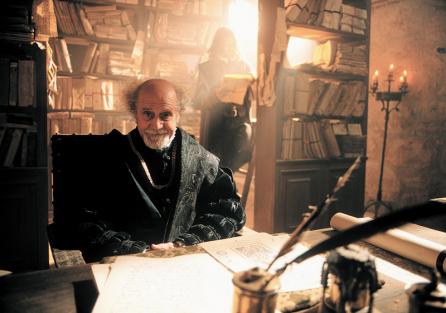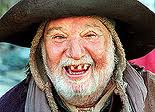
In all fairness, one must start by
saying that this film, after several setbacks, wouldn't have been
possible without the initiative and work of Rafael Álvarez. It will
premiere next Friday. Álvarez hasn't been directly involved
in the development of the script or selection of the actors,
although it is difficult to find fault in their performance.
However, his was the idea ten years ago to make a film based on the
monologues of the anonymous novel "Lazarillo de Tormes" in the
theatrical version of which he played the leading character.
Therefore, it is fair to say that the film is the baby of "El
Brujo," as he is nicknamed.
It has probably already been pointed out, but it should be
clarified that the film isn't strictly speaking a screen adaptation
of the picaresque novel "Lazarillo de Tormes", since most of the
action takes place when Lázaro is a grown up man. For that reason,
the title is "Lázaro de Tormes", and the references to Lázaro as a
child (Lazarillo) are very scarce. His role is well performed by
Manuel Lozano.
In the history of Spanish cinema several attempts have been made
to deal with this 16th century story. The screen versions of the
novel, directed by Florián Rey and César Fernández Ardavín,
produced in 1925 and 1959 respectively, are the best known.
However, neither of the two served me as a base nor were they of
any help to me in writing the script of "Lázaro de Tormes". The
former, for the simple reason that I hadn't seen it and the latter,
because it wouldn't have suited my purpose as it is a faithful
screen adaptation of the original.

Unfortunately, for health reasons,
I had to stop in the middle of the shooting, about
half-way-through, when everything was underway. At first, my
intention, apart from directing the movie, was to play the minor
role of the blind man. Paco Rabal replaced me as the actor in that
role, and producer Andrés Vicente Gómez deemed it appropriate to
have my friend José Luis García Sánchez substitute me as director
of the film. With García Sánchez, we limited ourselves to having
preliminary conversations after he saw what we had filmed so far
and before he started working on it. Our talks amounted to a quick
exchange of impressions in which we agreed on the main points. I
think that, apart from that exchange of impressions, García Sánchez
has worked with total freedom throughout the filming as well as in
the subsequent editing. What he obviously didn't do, since he
joined us after the shooting started was choose the cast, the
locations and approve or disapprove the set decorations. I don't
know to what extent this "unforeseen factor" has affected the final
product, "Lázaro de Tormes." I guess it's impossible to ever find
out about that, although I must say that I am very satisfied with
it.
Because of the wish to reflect current affairs, plus the general
lack of interest among filmmakers in screen adaptations of the
classics and the financial constrains of producing such
films, "Lázaro de Tormes" can be considered an unusual film
in Spanish movie theaters. However, Andrés Vicente Gómez told me
that he accepted the ideas of Rafael Álvarez, amongst other
reasons, because all the films he has made based on classical
literature have been very successful, in terms of reviews and at
the box office.
At any rate, I obviously do not have the slightest idea about how
the public will respond to "Lázaro de Tormes." I know the public
reacted very positively to "Gone with the Wind" and "Casablanca,"
but had I been asked to watch a private screening before either
film premiered, I wouldn't have known what to say in terms of how
audiences would react to them.
FERNANDO FERNÁN GÓMEZ.